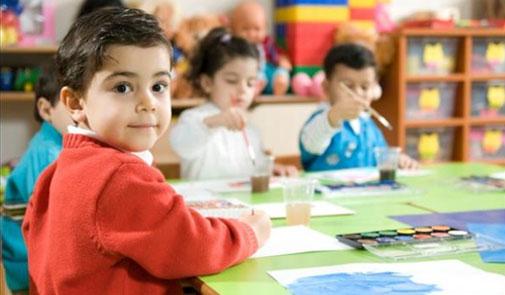Preparing Children For Nursery School
Nursery school is an institution for educating young children between the ages of three and five years. Allowing a child to make the transition from the comforts and security of home to an unfamiliar atmosphere, with prescriptive and descriptive norms of behaviour, is often extremely challenging for both parents and the child.
The parents are often concerned about their choice of institute while the child has to learn to adapt to a completely new environment. However, this transition to schooling is both essential and important.
It is advisable to prepare the child in advance for this change. There are some ways that can be followed by parents to ease this process of change for the child. These include, familiarising the child to his or her teachers, organising a trip to the school itself, ensuring the safety of the child, giving the child some space, and communicating with the child to address his or her concerns. A play meeting can also be organised for the child with the other children who have enrolled in the school so that the child can make friends before entering the new environment. When a child is separated from the parents for gradually increasing periods of time, they learn to individualise and gain a separate identity of their own. This allows them confidence to face new situations by themselves. As the child begins going to school, the parents could engage in active listening of the child’s daily activities at the school, and assist in the process of coping with the demands of the school and its curriculum.
Movement to a school environment from home is the continuation of the maturational process of the psychological states of the child. Margaret Mahler’s Object Relations theory can be applied here to understand how a child may develop competency to sustain at school. Separation-individuation is the process by which a child forms internal maps of the self and of others to be able to relate with the outside world.Separation-individuation is the name she gave to the process by which internal maps of the self and of others are formed. (Mahler, 1967)
The role of a parent is to train your child to train in certain areas to make him/her better equipped in the class. Some of theskills required at the beginning of Kindergarten are as follows.
- To identify some letters of the alphabet
- To grip a pencil, crayon, or marker correctly (with the thumb and forefinger supporting the tip)
- Use scissors, glue, paint, and other art materials with relative ease
- Write his/her first name using upper- and lowercase letters, if possible
- Count to 10
- Bounce a ball
- Classify objects according to their size, shape, and quantity
- Speak using complete sentences
- Recognize some common sight words, like “stop”
- Identify rhyming words
- Repeat his full name, address, phone number, and birthday
- Play independently or focus on one activity with a friend for up to ten minutes
- Manage bathroom needs
- Dress himself
- Follow directions
- Clean up after himself
- Listen to a story without any interruption.
Although curriculums may vary from school to school, general goals focus on children building strong pre-reading skills, practicing letter formation, enhancing listening and communication skills, getting an introduction to basic math concepts, and acquiring an active interest in the world. It is important to understand and have real expectations of what a child will acquire in school and prepare them accordingly.
Some other areas in which a child will normally be expected to develop competence are as follows.
Language Arts
- Recognize and write all of the letters of the alphabet in upper- and lowercase forms
- Write his first and last name
- Learn sounds corresponding to vowels and consonants
- Use initial consonant sounds and sound patterns to read words (for example, f + an = fan; r + an = ran)
- Identify several sight words, including names of colors
- Recognize and use rhyming words
- Retell a story including details
- Put events of a story in order
- Write simple sentences using sight words and phonics skills
Listening and Communication
- Listen attentively
- Raise hands or wait to speak
- Act on instruction and repeat spoken directions
- Engage in question-and-answer dialogue with classmates an8d teachers
- Work as a team on projects or problem-solving
Math
- Sort and classify objects using one or more attributes
- Recognize and write numbers to 30
- Count orally by ones, five, and tens
- Name ordinal numbers first through tenth
- Add and subtract using manipulatives (Cheerios, candy, etc.)
- Understand spatial relationships (top/bottom, near/far, ahead/behind)
- Compare quantities by estimating, weighing, and measuring
- Use graphs to gather information
- Recognize patterns and shapes
- Tell time to the nearest hour
- Count coins
- Recite the days of the week and months of the year
The Right Age to Join Nursery School
Finally it is important to consider the age at which the child should join school. There are a few reviews directed that investigate the perfect age for a little child to go to preschool. It has been found that with a specific end goal to decide this it is essential to perceive what kind of experience he is having outside preschool. There are many family units that have a kind of self-teach condition.
Initial days are hard for all children. Although with time, it becomes a smooth routine. One must keep talking and asking their child about their concerns and issues. Children need their parents more than anyone else.
Please note: The opinions expressed in this post are the personal views of the author. They do not necessarily reflect the views of mycity4kids. Any omissions or errors are the author's and mycity4kids does not assume any liability or responsibility for them.



